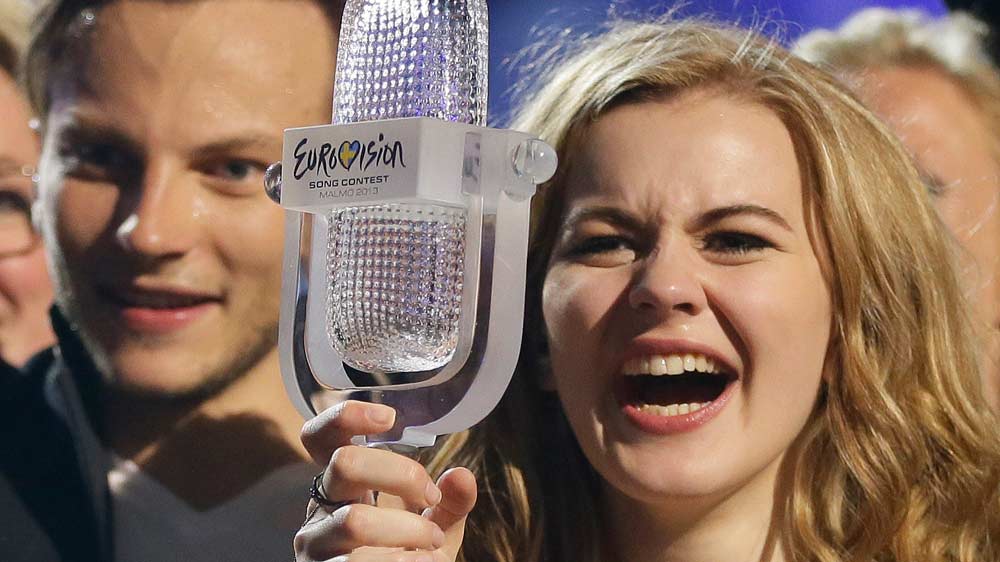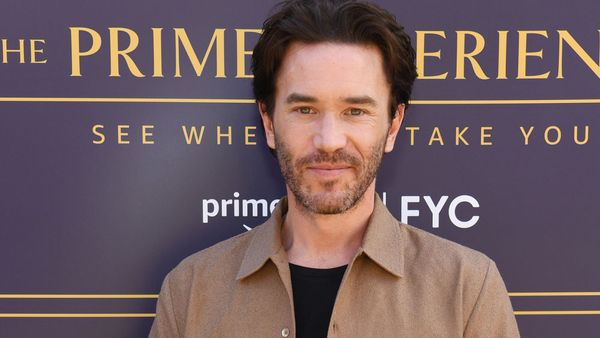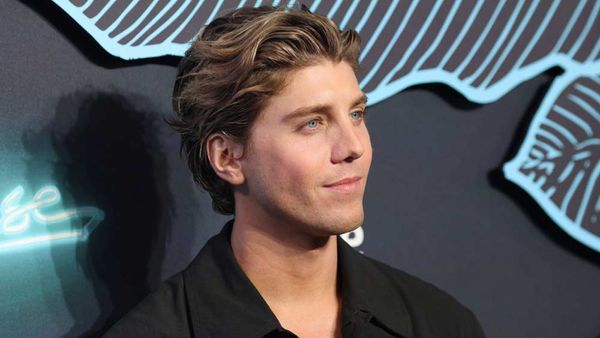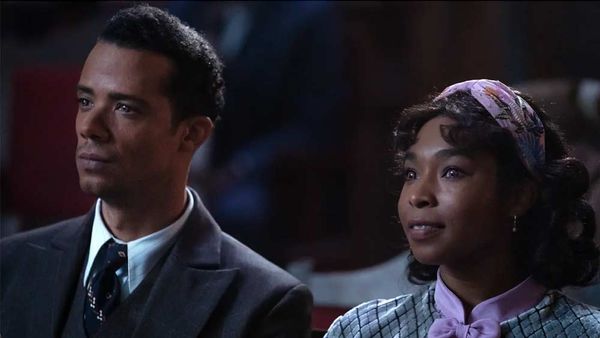Mar 27
EDGE Interview: Taylor Trensch on Acting with Cynthia Nixon (x8)
Frank J. Avella READ TIME: 14 MIN.
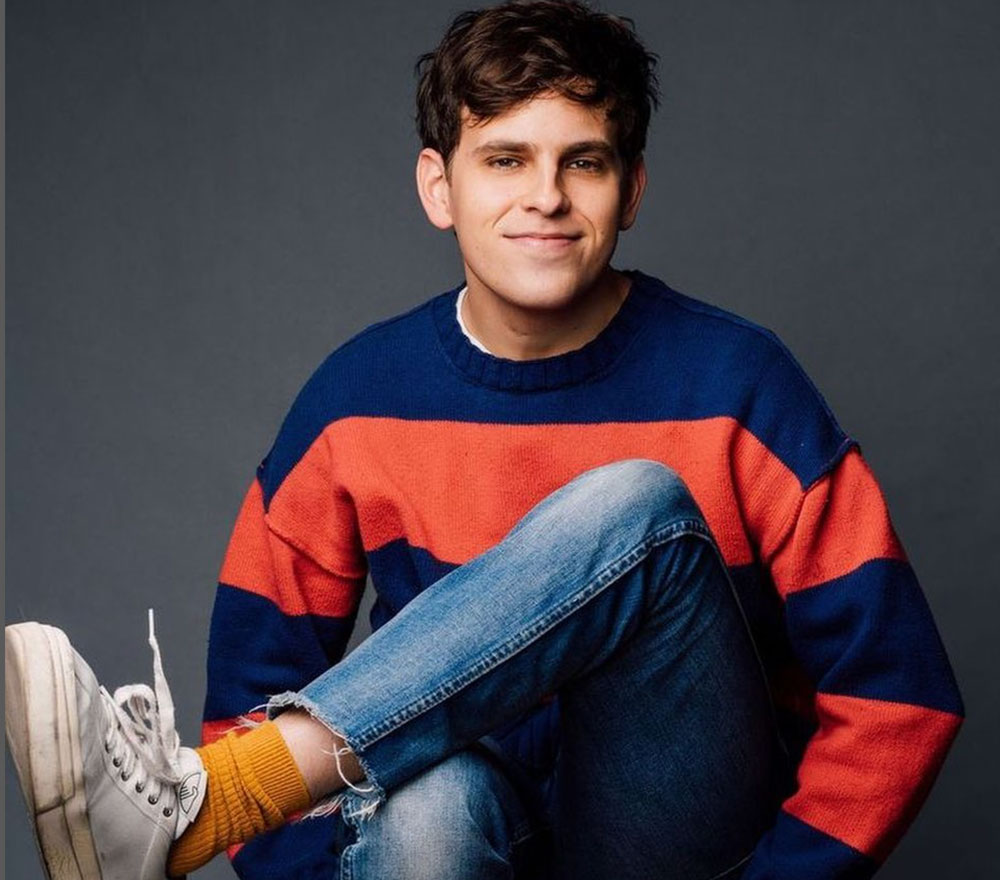
Source: Instagram
The out gay actor is currently killing it off-Broadway, opposite Cynthia Nixon, in The New Group's production of Jordan Seavey's beguiling, stirring, and penetrating new play, "The Seven Year Disappear," directed by New Group staple Scott Elliott.
This non-linear, multi-media two-hander revolves around the relationship between Miriam (Nixon), a world-famous, celebrated performance artist and her son/manager/precious confidante, Naphtali (Trensch). Miriam suddenly disappears for seven years and, as the piece bounces around in time, the audience is treated to a fast-paced, thriller-like, performance-art-esque experience where Naphtali endeavors to locate his mother, has wild sexual relationships with various men (all played by Nixon), and must eventually come to terms who he is with and without his mother.
The reappearance of Miriam coincides with the 2016 election. Naphtali has been working on the Hilary campaign as her LGBTQ+ liaison. He must finally confront Miriam, but will he get the answers he so desperately seeks? And was her vanishing just a part of some artistic stunt, or did it have deeper meaning?
Seavey, who wrote "Homos, or Everyone in America," has fashioned one of the most thought-provoking plays of the season with two powerful actors at its center. Nixon remarkably portrays a host of bizarre characters (eight in all: Miriam, as well as seven others) including Wolfgang, Miriam's curator and former lover who is now doing her son, and Michael, another older gent, this one hosting a meth orgy.
Trensch more than holds his own opposite Nixon. He fearlessly embodies Naphtali and goes on a journey of self-discovery that is truly captivating.
"The Seven Year Disappear" runs through March 31st at the Pershing Square Signature Center, with Live-stream performances Friday, March 29, at 7:30pm, Saturday, March 30, at 2pm and 8pm, and Sunday, March 31, at 2pm. (For more information about the livestream performances, click here.)
EDGE spoke with Trensch about the play and his career.
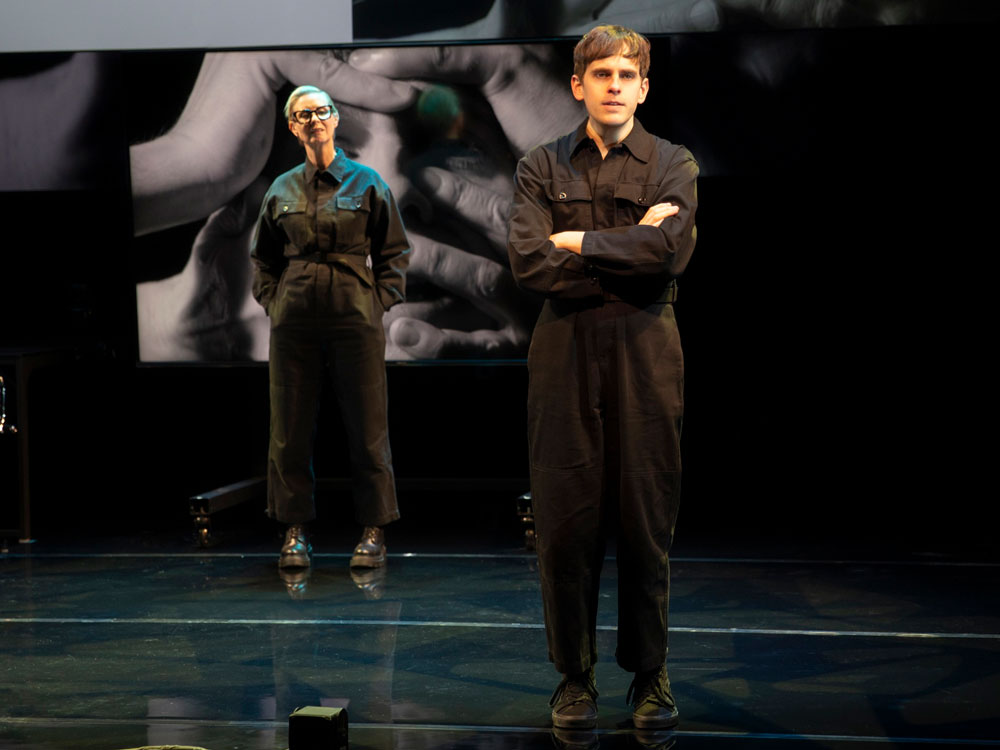
Source: Monique Carboni
EDGE: You've been with this project for several years. Can you share a little bit about how you first became involved?
Taylor Trensch: Sure. I knew Cynthia. We met at a synagogue honoring William Finn, the composer, several years ago. She was on the hosting committee, and I was singing a song of his from "A New Brain." Then she directed a reading of a play for The New Group that she very kindly asked me to act in. Then, a few years after that, she was given this script by Jordan Seavey and she very generously, very kindly threw my name out to the playwright. We had been doing readings and workshops of the play for a few years. And then, finally, The New Group very nicely programmed us in their season.
EDGE: Two things immediately struck me. Rarely do productions where multimedia is used work. And it works here.
Taylor Trensch: That's so nice to hear, thank you.
EDGE: And the non-linear narrative approach also works incredibly well.
Taylor Trensch: Jordan's last play, "Homos," which I saw – The Labyrinth Theater Company produced it – also had a really non-traditional structure, jumped around in time quite a bit. And I think he's uniquely equipped to make it work and make it make sense and clear for an audience.
EDGE: Can you tell me a bit about Naphtali? What drew you to want to play him?
Taylor Trensch: I mean, getting an email saying, "Would you like to be in a two-hander with Cynthia Nixon?" is just about enough. Even if he was completely silent on stage for the 90 minutes, I would have been like, sure.
But, also, Jordan has written this feast of a character, where you age seven years in 90 minutes. And you're on every single illegal substance in those 90 minutes. And there are such great moments of comedy, and it's also really heartbreaking and fragile. It just felt like I would get to use so many modes. That is so rare. I feel like not since drama school have I been able to like really – I hate this phrase, but use tools in my actor toolbox.
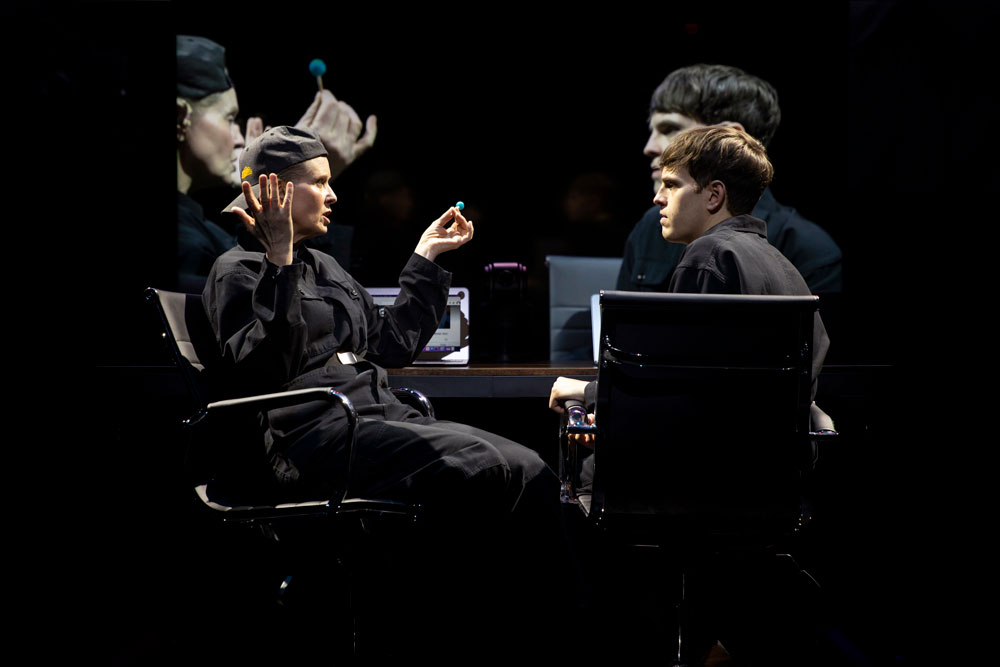
Source: Monique Carboni
EDGE: And the chemistry between you and Cynthia, on all levels, is off the charts. As mother and son. And then she plays your lovers. You were both child actors, do you feel that bonded you and maybe had something to do with how good you are together?
Taylor Trensch: Yeah, I think so. I'll say she was so much more successful than I was as a child actor. She was in "Amadeus," and I was in an independent movie in L.A... [Laughs] We both love theater so much. We both go to see so much theater. We both love acting, which feels like a silly thing to say, but it can be really grueling sometimes. And I think we both just genuinely love doing it. I think that connected us. And I think we also both just love this fascinating play so much.
EDGE: Are you guys similar in your processes?
Taylor Trensch: Yeah, I think so. Her process for this play, especially, was so much more daunting than mine was. I only had to worry about building one character, whereas she had to build seven or eight.
In fact, there was even one scene much earlier on in the development process where she played six characters in a single scene. And every single character was from a different country! She had such a humongous task at hand... It was actually really nice to watch. Because she's been acting since she was a kid, I've admired her my whole life. And it was really nice to see [her] come to the first day of rehearsal, not with this perfect performance ready to go in front of an audience. She took her time and really used the rehearsal process to discover the play and learn things... It was a really nice, symbiotic process.
EDGE: The play is such a complicated take on the relationship between a mother and child. Because it's always presented a certain way in our culture, mothers are supposed to be these loving, nurturing creatures. But they're not always like that. In the play, the absurdist aspects of it notwithstanding, it was so real. There's a lot of love there, but she's not your traditional mother.
Taylor Trensch: Certainly. We were just talking about this yesterday, that's one of the things I think that struck me most when I first read the play was that we're pushing the limits, or changing the conversation about what a mother's role is in a child's life. We're asking the question, "What does a mother owe her child?" And for so many generations prior to this one, it was exactly like you said: A mother is the caretaker, a mother provides love and warmth and support. And I think that is changing in the culture in a really exciting way... I love that the love that she provides Naphtali is a love that we don't recognize, but it doesn't mean that it's not full and real for her.
EDGE: And Cynthia is miraculous. Her task of playing so many roles is not an easy one, but it really does work.
Taylor Trensch: I'm so glad to hear you say that. Yes, she is just one of the greatest. What I love so much about what she's doing is, I feel like there are other actors who would do these really heightened exaggerated caricatures of these people to make them really distinct. I love so much that she's made them all really subtle, but totally honest, real people. There's something so fascinating about it, so precise, and yet there's always this thread of Miriam, the mother, throughout the play. You never lose sight that this actress is playing all these parts. And I think that's key in making the play work, making that device effective.

Source: Monique Carboni
EDGE: And working with Scott Elliott?
Taylor Trensch: I love Scott Elliott. I had seen so many things at The New Group before, and I was always so impressed with the risks they took. I think they always do really challenging, provocative work that you don't often get to see. For many years, we [were] developing the play with a different director. Scott came in later in the process and he unlocked a lot of things for me as an actor. I feel like I cracked the play open in new ways thanks to his sensitive, insightful work as a director.
EDGE: You're an out queer actor playing an out queer character. Is that something that's important for you?
Taylor Trensch: Yeah, I love it. It's funny, I think about all of the straight actors who play mostly straight characters and no one bats an eye about that. I love playing queer characters because it doesn't feel like I'm being pigeonholed into something. They're all so wildly different. And, also, it's something I don't have to think about playing. I don't have to think about trying to signal to the audience that I'm a gay person or a queer person. It just comes naturally... I think there are, obviously, many straight actors who can give amazing, nuanced performances in queer roles, but I do think an audience can sense a certain underlying authenticity which, when we cast authentically, just helps the realism of the play.
EDGE: I recently spoke with your "Dolly" co-star Gavin Creel about being queer in 2024. And he made a really interesting point about how when you speak to the press, for instance, they seem to make everything about being queer. They don't do that with straight people.
Taylor Trensch: Exactly. I know. I mean, I think it's certainly an interesting lens to walk through the world in. It certainly affects so many things in my life. [Laughs] But that is so fascinating, that it's often the headline when you read a Jim Parsons interview, or Jonathan Bailey interview, or a Colman Domingo interview.

Source: Joan Marcus
EDGE: So how do you think the theater community is doing in terms of queer representation?
Taylor Trensch: I think and I hope that we're doing a little better than Hollywood. Because there are so many queer theater artists, and there have been since the beginning of time. I think about all of the people who I admire most, as actors, writers, directors and designers, and so many of them are queer people who get the opportunity to do what they love, over and over again. I think we're doing okay; I hope so.
EDGE: Groups like The New Group help because they're telling queer stories that need to be told. They're not really doing that on Broadway right now.
Taylor Trensch: Off Broadway, in general, is always a little ahead of the curve because of the financial pressures, this expectation to recoup. It's not quite the same as it is doing these huge commercial Broadway runs.
EDGE: That's a perfect pivot to asking you about Aaron Sorkin, because you've been in two of his Broadway adaptations, "To Kill a Mockingbird" and "Camelot." Both amazing productions. What is it about Sorkin's work that draws you to these projects?
Taylor Trensch: Oh, gosh, I just think he's one of the smartest, most creative, best writers we've got. "The West Wing" is one of my all-time favorite TV shows. And I'll never forget, I read the very first draft of "To Kill a Mockingbird." Years and years and years ago, Scott Rudin and Bart Sher invited Celia Keenan-Bolger, Will Pullen, and myself to read the first draft, thinking eventually he would cast nine-year-olds to play the roles of the children. I remember reading that first draft, and I was like, "This could go up tonight in front of an audience paying hundreds of dollars, and they would feel so totally satisfied." Especially with "To Kill a Mockingbird," I don't think there's anybody more equipped to write about action taking place in and around a courthouse. He's so brilliant at that.
And I love, too, so much, what he did with "Camelot." It was a musical I knew very little about before doing our version. And since then, I've gone back and watched the movie, which is beautiful, but I love so much that he put the focus on people and the power of people, of organizing, coming together and changing the world vs. supernatural abilities taking care of that. I'm just forever in awe of his abilities as a writer.

EDGE: You've been in a number of big musicals – "Hello, Dolly!," which you and Gavin were great in. What was it like stepping into a character like Barnaby?
Taylor Trensch: It was a blast... It was such a joy machine. The design, the score, every single person involved just made me smile from ear to ear. Gavin Creel is somebody I've loved for so long. His voice on Broadway cast recordings has been something that I've devoured for years and years. And it was a real dream come true to work with all of these titans that I've admired. And just to do something that made people happy at a time when, in our country, we were all feeling a little low.
EDGE: And that's a perfect pivot back to "Seven Year Disappear," because it is grounded in that specific election [2016], it's woven into the fabric of the text.
Taylor Trensch: Jordan started writing this play about seven years ago, so I think he couldn't help but focus a little bit on the political climate in this country. And, in many ways, I think the whole play is a metaphor. Miriam's disappearance is a metaphor for progressive America taking a backseat or disappearing a little bit – feeling comfortable because of Obama's presidency. I think that's part of why Trump got elected. We all got a little complacent and didn't participate in the system maybe as much as we should have or could have. It is certainly chilling to do some of those scenes as we approach another election. The threat of another Trump presidency feels very real and scary. Earlier in our run, there were some scenes where we talked about Hillary Clinton that used to get a lot of laughs and the closer and closer we get to election day it starts to get really tense in the theater. It's an ooky spooky time.
EDGE: It sure is. You guys are taking the show to another level, you're live streaming these last few performances.
Taylor Trensch: I know! I'm so excited. Theater is so expensive – not to mention, if you don't live in New York City the travel and the accommodations can [make it] feel really impossible to make a trip to New York and see theater, so I'm so grateful that we'll get to share it with people who wouldn't be able to see it otherwise. I hope it translates, but I do also think that because there's so many video elements in our show, hopefully that'll help connect the distance the viewer might feel watching it on video instead of seeing it live in the room.
This interview has been edited for content, clarity and length.
For more information about the livestream performances, click here.
Frank J. Avella is a proud EDGE and Awards Daily contributor. He serves as the GALECA Industry Liaison and is a Member of the New York Film Critics Online. His award-winning short film, FIG JAM, has shown in Festivals worldwide (figjamfilm.com). Frank's screenplays have won numerous awards in 17 countries. Recently produced plays include LURED & VATICAL FALLS, both O'Neill semifinalists. He is currently working on a highly personal project, FROCI, about the queer Italian/Italian-American experience. He is a proud member of the Dramatists Guild. https://filmfreeway.com/FrankAvella https://muckrack.com/fjaklute

